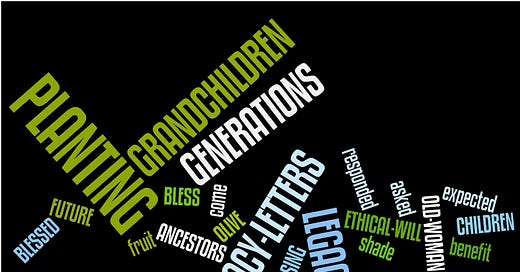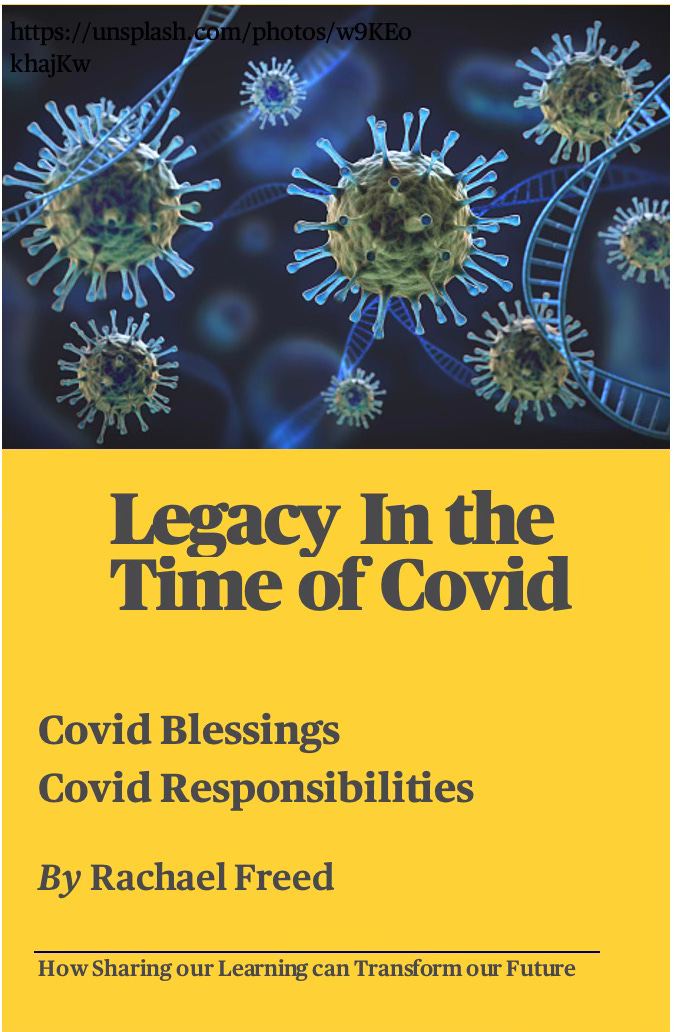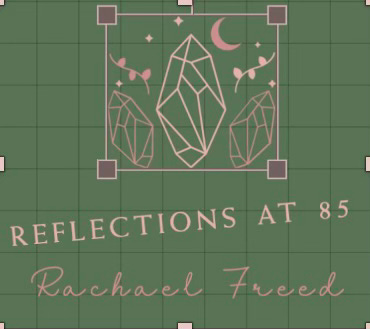Again, I must begin with apologies for not writing sooner, but, you know . . . life and taxes happen, and both took priority, but I’m back. And I’m back to working on a totally new draft of my Legacy/Covid book. I just completed the introduction, and thought I’d share it with you, for two reasons. I very much want your feedback about: do you get the importance? Are you tempted to want to read more? And two, would you consider writing something of your experience to be included in the book? If so, let me know in the comments and provide me with a phone # or email so we can talk about it. And thanks for reading!
Introduction:
Why am I writing this book? Two reasons, each involve a personal story.
Let me begin by introducing myself to you. Since 1995, almost thirty years ago, I’ve been fascinated by the “ethical will,” a tradition from ancient times, when rabbis encouraged their (male) congregants to write to their sons to pass on the community’s values, to bless them, and share special requests about their death and dying.
After my first exposure to the ethical will, I, the rebellious feminist, raced home, enthusiastically opened my computer, and began to write to my son and daughter, although I was not a man! From that moment forward, almost everything I saw flashed “legacy” to me, and I quickly filled a manilla folder compiling quotations, articles, and book references, but I didn’t know why.
Then in the summer of 1999 I attended an adult study retreat. When you know me better through this book, you’ll realize how shocking the experience I’m about to share with you was. I’d never heard “a voice” in my life before that moment, and it would be 24 years until I heard the voice again, a voice that had the power to both guide and chide me. The voice, soft but strong, clearly feminine, spoke to me in a class I was taking about the ethical will. The voice said just eight words that day and they changed my life path: “Turn this into a healing tool for women.” I couldn’t believe my ears (or the inside of my head!) I raised my hand, shared what I’d heard, and the rabbi-teacher responded, pointing his finger at me, saying, “Do it! It’s an important niche.”
For some unknown reason, I trusted the voice and the rabbi, and shifted my psychotherapeutic career, and began to contemporize and feminize the ethical will. The ethical will (a will of values), not a friendly or well-known term, I changed to “legacy letters” but maintained the ancient principles of passing on values, blessing the letter’s recipients, and when appropriate suggested writing a legacy letter to let the next generation know what the writer desired as she aged and approached the end of her life.
Time passed; I wrote several books about legacy writing, became well-known nationally (in women’s circles and aging well groups) as a facilitator of workshops about legacy letters. Giving women their voices was such an impactful endeavor, it has kept me occupied and purposeful for a quarter of a century.
I continued working into my eighties but began to think seriously about retiring, passing my work to others I’d trained, so the work would continue after I’d retired. I accepted fewer invitations to speak or facilitate workshops, and those I did accept were only on Zoom. I should have known from my past that “Humans plan and God laughs.”
A renewed purpose became clear one morning in the third year of the Covid pandemic when I awoke from a dream. I heard again the voice I’d only heard once before, 24 years ago. She said, “You’re not done yet.” My response was, “Oh shit!” seeing my retirement plan fly out the window. She calmly continued . . . “You have one more book to write; it’s about the need for legacy writing about Covid.”
She was right! So here I am and glad you’re here too.
The purpose of this book then is to encourage people in our generations who have lived through Covid to pass on to future generations what we’ve learned, so that they will not be ignorant and totally unprepared when the next pandemic raises its deadly head.
My second personal story points out how important it is to share our experience and knowledge: because the chances of us being adversely affected by what we don’t consciously know is beyond measure.
My mother’s older sister, Lillian, died of the Spanish flu at age fifteen in that 1918 pandemic. I can only imagine how traumatic that must have been for my mother’s family (three older siblings and Mom’s and Lillian’s parents). Mom was only three, too young to understand grief, loss, and death cognitively, but she would surely have been affected. As the baby in the family, she would have felt the joy go out of the house, experienced the family solemn and unusually silent, though she didn’t understand why.
As an adult, I learned that after Lillian’s death, my Grandmother Minnie spent most days sitting on a bench at Lillian’s grave at the cemetery. Her depression must have affected my mom. I know that it affected her oldest sister, Reva, for her whole life. She left school after the 6th grade to care for my mom and my Uncle Mory, who was five.
What seemed most strange was that neither my Aunt Lillian nor the flu pandemic was ever included or even mentioned in any family discussion of our history.
It was as though it had never happened! That Aunt Lillian had never existed!
I question today, more than 100 years later, how that traumatic and unspoken loss affected my mom, my aunts, uncles, and in the next generation, my cousins, my sister, and me. Was my grandmother’s silent depression causal in my mother’s depression, my sister’s – both dying early? Does this unexplored, unfinished family grief still haunt us in this second generation and beyond? I know that the mores in my grandmother’s superstitious generation included avoidance about discussing death.
Here is a theory that I’ve found compelling ever since I read it (during my years as a psychotherapist). It is Susan Griffin’s argument in her brilliant 1992 book, A Chorus of Stones:
“I am beginning to believe that we know everything, that all history, including the history of each family, is part of us, such that when we hear any secret revealed, a secret about a grandfather, or an uncle, or a secret about the battle of Dresden in 1945, our lives are made suddenly clearer to us, as the unnatural heaviness of unspoken truth is dispersed. For perhaps we are like stones; our own history and the history of the world embedded in us, we hold a sorrow deep within and cannot weep until that history is sung.”
I was inspired by Griffin’s theory to understand the damage done to my family, by my family, due to their silence after Lillian died. No one in the family was given the opportunity to talk about their feelings, their grief, or their fear that they could be next.
I couldn’t help but compare it to the silence between first-and-second-generation Holocaust survivors. The original survivors kept silent about their experience, I believe, for at least two reasons: the first, that it remained too horrific to talk about long after the war, and survivors tried, though unsuccessfully, to bury their memories. The second was that many believed their silence would protect their children from the horrors. But as Griffin suggests, we each carry everything in history, like stones, if we can’t express our grief. Many second-generation Holocaust survivors have suffered mentally and emotionally without understanding the cause, and in their silence, they pass the same silence and stones to third and fourth generations.
“. . . a nameless grief now named hence lifted…when we hear any secret revealed. . . .” – Susan Griffin
Writing legacy letters is our gift and responsibility especially when we’ve survived much and hopefully learned from those experiences. We need to write our thoughts, feelings, personal experiences, learning, and values. And just as significant is our need to acknowledge and process our grief and learn about the collective and enduring residuals of the Covid years, for our own healing, for the larger world, and for future generations.
What will future generations need to know about Covid? Much may be forgotten, but some things are essential to remember and pass forward. Because stories and stones are assumed to have a deeper impact on readers and viewers than instructions, I began with two personal stories that I hope both engaged you and enticed you to write your own stories, experiences, learning and grief concerning the Covid pandemic to the next generation. And secondarily, this writing is for you. Reading and writing may lighten your load of silence to reopen your heart and soul that have been shielded by secretive silence.
Here is a poem by Sarah Bourns that can help us to unlock our memories:
We’ve All Been Exposed
We’ve all been exposed.
Not necessarily to the virus
(maybe...who even knows).
We’ve all been exposed BY the virus.
Corona is exposing us.
Exposing our weak sides.
Exposing our dark sides.
Exposing what normally lays far beneath the surface of our souls,
hidden by the invisible masks we wear.
Now exposed by the paper masks we can’t hide far enough behind.
Corona is exposing our addiction to comfort.
Our obsession with control.
Our compulsion to hoard.
Our protection of self.
Corona is peeling back our layers.
Tearing down our walls.
Revealing our illusions.
Leveling our best-laid plans.
Corona is exposing the gods we worship:
Our health
Our hurry
Our sense of security
Our favorite lies
Our secret lusts
Our misplaced trust.
Corona is calling everything into question:
What is the church without a building?
What is my worth without an income?
How do we plan without certainty?
How do we love despite risk?
Corona is exposing me.
My mindless numbing
My endless scrolling
My careless words
My fragile nerves.
We’ve all been exposed.
Our junk laid bare.
Our fears made known.
The band-aid torn.
The masquerade done.
So what now? What’s left?
Clean hands
Clear eyes
Tender hearts.
And here’s another, this poem by Kitty O’Meara, also written in 2020, and very optimistic:
And the People Stayed Home
“And the people stayed home.
And read books, and listened, and rested, and exercised,
and made art, and played games,
And learned new ways of being, and were still.
And listened more deeply.
Some meditated, some prayed, some danced.
Some met their shadows.
And the people began to think differently.
And the people healed.
And, in the absence of people living in ignorant, dangerous, mindless,
And heartless ways, the Earth began to heal.
And when the danger passed, and when the people joined together again,
They grieved their losses, and made new choices, and dreamed new images,
And created new ways to live and heal the Earth fully, as they had been healed.”
Chapter One What Should I Write About?
Thank you for reading and commenting. I hope to hear from you soon with your own offering, for your healing, and for the rich variety that will fill the body of this book.







Don’t give up. Maybe post it at your local community center, your church if you have one, workout sites, local senior living places… good luck.
Thank you. I had one person enrolled, so I will do one session first weekend of May. The presenting org. Wanted it invitation only and only one person wanted the class.